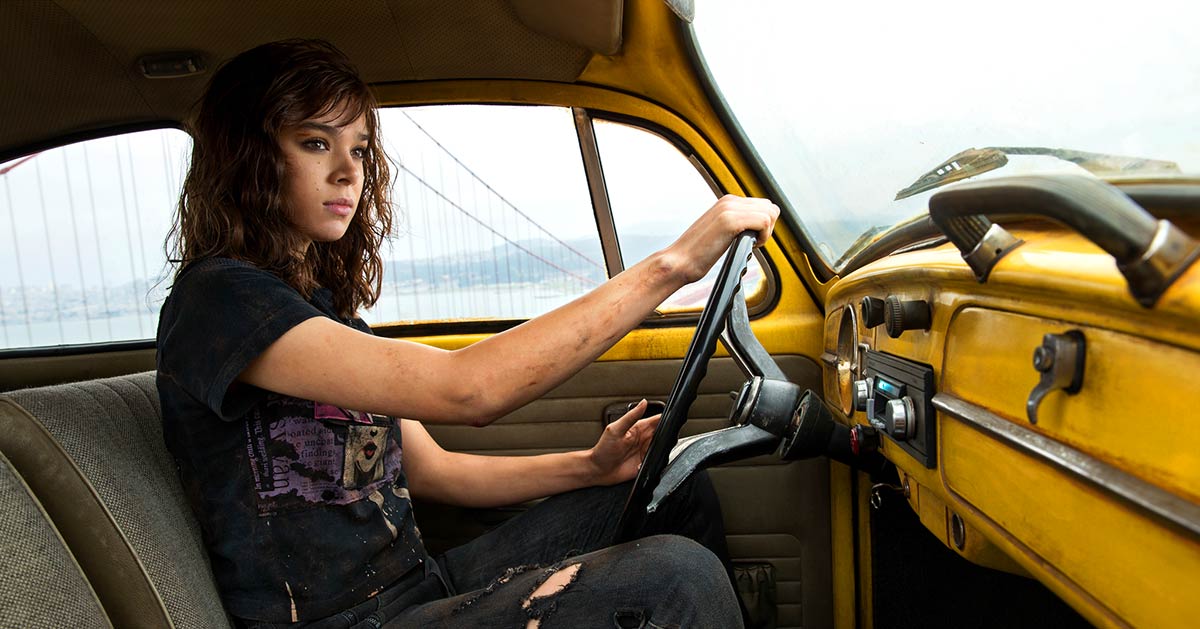Capitalizing on the nostalgia of a beloved 1980s cartoon and toy that it never had much affection for in the first place, Michael Bay’s brand of bombastic Bayhem converted Hasbro’s “Transformers” into a successful multi-billion-dollar global franchise for Paramount. But throughout ten years, and five increasingly crude, overwrought, tuneless, and incoherent films, the series— “Transformers” only in name, really— mutated directly into an excuse for Bay to print money and blow sh*t up, while embracing the worst tendencies of toxic male aggression.
READ MORE: ‘Bumblebee’ Trailer: Every ‘Transformers’ Hero Has A Beginning
Having left audiences exhausted (“Transformers: The Last Knight,” grossing nearly half of its predecessor worldwide), Paramount Pictures pulls the tired franchise off the scrap heap and turns to franchise’s most likable character “Bumblebee” to return to the pole position. Going back to the drawing board with an origin story, “Bumblebee” reanimates the robots-in-disguise series by leaning into everything Bay dismissed – namely, its 1980s origins, its coming-of-age sensibilities, and its all-sparking sense of adolescent wonder and charm.
READ MORE: Bumblebee Sneak Suggests It’s The Best Transformers Movie Ever [CinemaCon]
A leap forward, with the occasional backwards steps, director Travis Knight (the incomparable “Kubo and the Two Strings“) and up-and-coming writer Christina Hodson (the upcoming DC team-up film “Birds of Prey“) guide this robo-fest down a totally tubular path, shaking off the problematic Rock ‘em Sock ‘em Bay clamor and replacing it with the best tendencies of ’80s Amblin movies (and periodically, the worst too).
“Bumblebee” centers on the eponymous character hiding out in a Californian beach town junkyard in the late ’80s. Meanwhile, Charlie Watson (Hailee Steinfeld) is a teen trying to discover her place in the world and comes across Bumblebee, broken and battle-scarred. Following the discovery that the car is no ordinary VW bug and fun adventures ensue. However, the good times are cut short when the U.S. government and manipulative Decepticons—posing as being virtuous transformers— start gunning for them both.
“Bumblebee” makes no attempt to hide its intentions and sometimes leans too hard into trying to emulate its ’80s charms. But the magic of Steven Spielberg—still an executive producer— is present and if not fully captured well, likably reproduced. Some moments feel like you’re watching something by Spielberg, Robert Zemeckis, Richard Donner or Joe Dante, backed by a John Hughes-y script (with a needed progressive lens). Dario Marianelli‘s score feels like a gigantic homage to John Williams and Alan Silvestri and the film’s jubilant soundtrack could easily be mistaken for “Now That’s What I Call 1987.”
Coming off showing her full potential in Kelly Fremon Craig‘s “The Edge of Seventeen,” Hailee Steinfeld— believably confident, conflicted and vulnerable here — continues to grow into her abilities; not only subverting the portrayal of women in these often-sexist pictures, but the decade its pays tribute to. Charlie is represented with an emotional intelligence that almost feels like atonement for the way the series has treated its women in the past, and a promise to do better in the future.
Her character is a bit of a typical tomboy, but not cloyingly so. She navigates growing up, dealing with tragedy, meeting a cute boy, and having space alien robots fighting all around her in her own way, not held captive by the male gaze or unreal expectations.
“Bumblebee” has spectacle sure, but the film also has a tender heart, well-evinced by the bonds and affections Charlie and Bumblebee demonstrate for one another while on the lam from the law. This trope: the child and their magical friend is perfectly rendered. Knight does his best Spielberg in these moments, but also draws from Hayao Miyazaki, turning Bumblebee his gentle, automated Totoro. Moments like these coupled with causing a little mischief for mean bullies and surveying the California seaside, are among its best.
“Bumblebee” does falter a little when it comes to its violence. Yes, you expect a little rough-and-tumble body-slamming in a “Transformers” movie. However, for a film with a sweet tone, and a gentler youth-oriented quality, seeing a helpless robot ripped in half and doomed human onlookers zapped to spatter-goo feels out of touch with this new “Transformers” direction. “Bumblebee” frustrates when it dips its toes back into these Michael Bay waters and gets a bit too scrappy for its own good. Audiences heartened by its sense of fun and joy may be taken aback when the movie gets a little regressive.
A crowd-pleaser for sure, “Bumblebee” can feel a little corny and on-the-nose when it comes to ingratiating itself to the decade and formula it idolizes, but overall, it’s a strong adaptation of what many wanted in the first place: a live-action version of the cherished 1980s animated cartoon. Perhaps not quite as perfect as it promises to be at first, Knight and his writers deliver an effort that gets this series back on the right track with the capacity of a promising, warm future. We’ll always have “Transformers” movies as long as they keep making money and selling merchandise, so they might as well feature the ‘Bee’s kinder, more invigorating zeal. [B]





